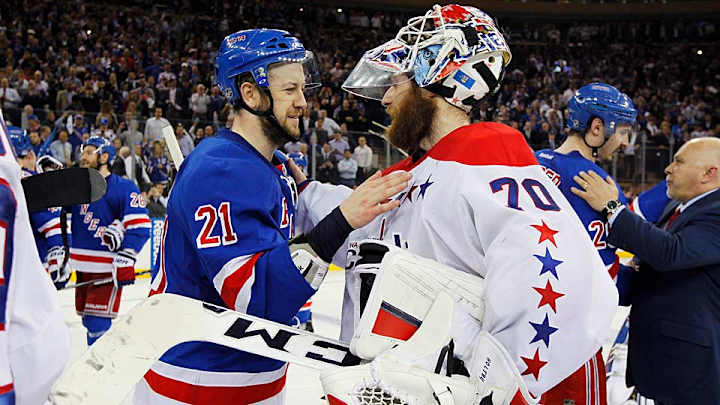NHL’s wave of pre-arbitration deals a sign the system is working

And then there were four.
With the pre-hearing signings on Monday of Derek Stepan (by the Rangers for six years and $39 million) and Colin Wilson (by the Predators for four years and $15.75 million), only four of the NHL’s 25 potential arbitration cases remain unresolved. The Capitals’ Marcus Johansson has his hearing scheduled for Wednesday. Senators rookie sensation Mike Hoffman is set for Thursday while the Wild’s Erik Haula and the Maple Leafs’ Jonathan Bernier are slated for Friday.
Odds are, though, that none of the four will have their next contract decided by an arbitrator. And that means the system is working.
The NHL’s salary arbitration process isn’t so much a mechanism for solving disputes as it is a shot clock urging sides toward a mutually acceptable agreement before the buzzer sounds. The threat of a neutral third party taking the decision-making power out of the hands of players and owners has a way of helping feuding sides find common ground.
It’s clear that arbitration has become the nuclear option that neither side wants to explore. In 2013, all 15 cases were settled in advance of hearings. Last summer 22 of 23 disputes reached an agreement either before they were heard or, in the case of P.K. Subban, before the arbitrator could rule. The only exception: Vladimir Sobotka, who was taken to arbitration by the Blues after he’d already signed a three-year deal to play in the KHL. The one-year award from the arbitrator would only come into play if/when Sobotka decided to return to North America, a likely but not sure event.
• Free agent signing tracker | Available free agents, cap space
The same pattern is unfolding this summer. In 20 of the first 21 cases to this point, the hearings have either been canceled entirely or set aside as a result of a contract being agreed upon outside of the arbitrator’s chambers.
The only exception was the one-year, $1.2 million award given last week to Ottawa’s Alex Chiasson. The Senators had proposed a $1 million deal while Chiasson had requested $2.475 million.
Tales from arbitration: NHL salary hearings an old fashioned bruisefest
In Chiasson’s case, Ottawa probably felt like it had nothing to lose in going to the arbitrator given his limited bargaining position (26 points and 13:22 of ice time last season, 11th among the team’s forwards). He can fill a roster spot but he’s entirely expendable. Typically, though, teams are just as anxious as players to avoid arbitration because of the potential for acrimony. Players would rather not put on a suit only to sit there and have their contributions demeaned by their employer—that has a way of souring relationships—and teams would prefer to avoid creating a schism with long-term implications.
That doesn’t mean that we won’t hear from an arbitrator before the summer is over, though. There’s some disconnect between Washington and Johansson, a promising player whose value to the team has decreased with the acquisition of top-six wingers Justin Williams and T.J. Oshie. And there’s no telling what Toronto is thinking with Bernier. The Leafs could decide that it’s better to take the one or two-year award available through arbitration, no matter what the dollar figure may be, than commit longer term to a goaltender who underperformed last season (21-28-7, 2.87 goals-against average, .912 save percentage).
The threat is real. And that’s why the arbitration mechanism is working so well.
